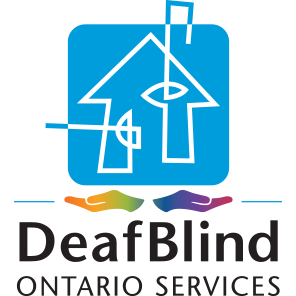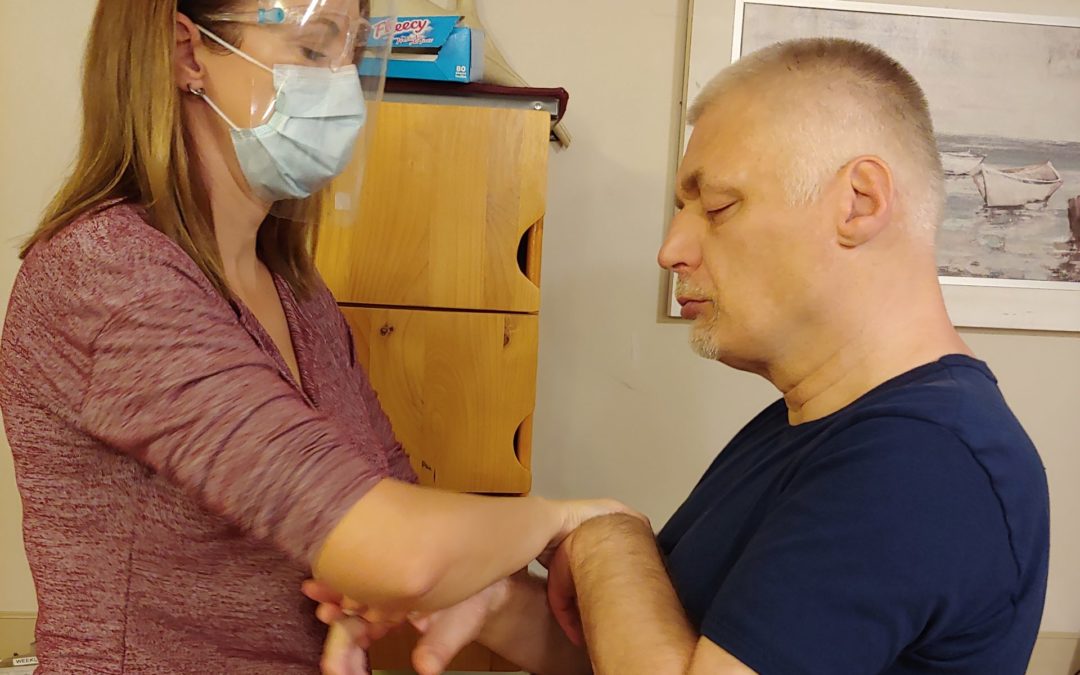It’s never too late to learn something new, gain new experiences and grow as an individual. For Val Huffman, this idea motivated her to choose a second career as an intervenor. She notes that it can also apply to the individuals she supports at DeafBlind Ontario Services who are deafblind.
After years of running her own business, Val was ready for a career change and enrolled at a local college in their Social Services Worker (SSW) program. However, after her first semester, she soon realized that she needed to explore the right career path for her. After speaking with a friend over lunch, she connected with her friend’s neighbour who worked as an intervenor. This conversation lead to Val seeking out and completing a placement at DeafBlind Ontario Services in her third semester before graduating from her SSW program and later being hired.
“I wanted to work for an organization that celebrates the uniqueness of the individuals we support and I enjoy seeing them thrive as they learn new skills. At DeafBlind Ontario Services, every person is treated as an individual, they are unique and have the capacity to learn and grow,” says Val.
She adds that, “Although I was a bit overwhelmed, just like anyone who is starting a new job, learning about the company and the responsibilities of the position, I also felt supported by my co-workers. They helped me as I met the challenge of learning a new language – Signing Exact English (SEE) – so that I could communicate with the individuals we support.”
SEE is one of a number of methods of communications that individuals who experience both hearing and vision loss combined may use in working with an intervenor to gain independence, build their life skills and actively participate in all areas of their lives. Val additionally communicates with other individuals she supports using Adaptive Interactive Tactile Sign Language (AITSL) where the individual supported uses a hand over hand method to sign with an intervenor.
Her advice for anyone seeking a new career is, “take the opportunity to grow –don’t be afraid to challenge yourself and learn new skills.”
Val overcame her fears as she continued to receive on the job training, including specialized training opportunities to build and strengthen her skillset. Because every person with deafblindness experiences a varying degree of sensory loss, each person will use their own unique and individual way to communicate. An intervenor draws on their specialized training to build trust and create a connection with the individual(s) they support.
“There are many different paths that can lead to a career as an intervenor,” she reflects. She also notes that the intervenors she works with use their transferable skills from a wide range of educational backgrounds to support the variety of people they support including, Personal Support Worker (PSW), Developmental Services Worker (DSW) or other related health, social services and disability programs.
For Maria Peralta, her journey was a little different. She worked in the Philippines as a nanny before coming to Canada in 2005. While working at a factory job as well as part-time at a coffee shop, she learned about an opening at DeafBlind Ontario Services through a friend.
Maria was able to work as a full-time intervenor by putting her transferable skills from her Personal Support Worker (PSW) certificate, her nurturing personality and on the job training from DeafBlind Ontario Services to use.
According to Maria, “It’s a really interesting role that allows you to feel proud of yourself because not a lot of people have the opportunity and ability to communicate with individuals who are deafblind. This job is amazing because I know that, at the end of each shift, I’ve helped them in different ways to keep them safe and happy.”
To build awareness of this rewarding career choice, a new National Occupational Classification Code (NOC) now includes “intervenor” and “deafblind intervenor” roles. Employment and Social Development Canada (ESDC) and Statistics Canada released this new code on September 21, 2021 and will fully implement it later in 2022.
Job seekers such as students, people exploring a second career choice as well as new Canadians like Maria can now find additional details about the main duties and educational requirements by accessing NOC code 42203 at https://noc.esdc.gc.ca.
To apply, visit https://deafblindontario.com/careers/.




Recent Comments